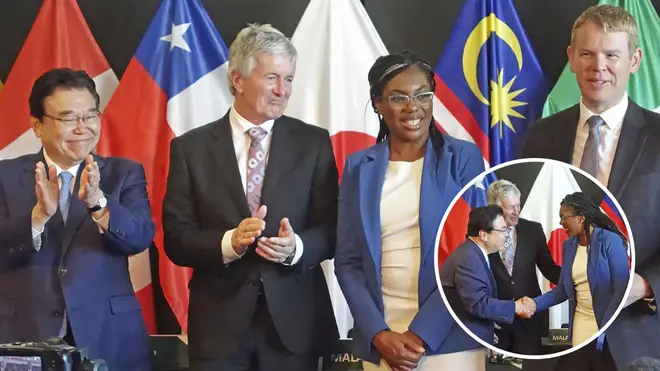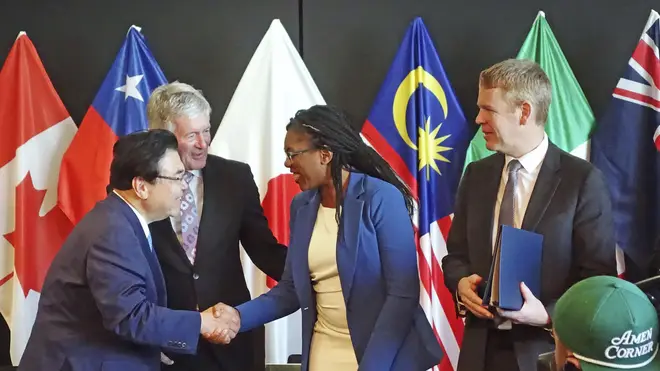
Shelagh Fogarty 1pm - 4pm
16 July 2023, 08:45 | Updated: 16 July 2023, 09:14

The UK has signed off on membership to a major Indo-Pacific trade bloc, bringing British businesses one step closer to being able to sell to a market of 500 million people with fewer barriers.
Business Secretary Kemi Badenoch signed the accession protocol to the Comprehensive and Progressive Agreement for Trans-Pacific Partnership (CPTPP) in New Zealand on Sunday.
Britain is the first new member and first European nation to join the bloc - which already includes Australia, Brunei, Canada, Chile, Japan, Malaysia, Mexico, New Zealand, Peru, Singapore and Vietnam - since its formation in 2018.
It represents Britain's biggest trade deal since leaving the EU, cutting tariffs for UK exporters to the group of nations which - with UK accession - will have a combined worth of £12 trillion.
Britain and the other 11 CPTPP members are now set to begin work ratifying the deal, which in the UK will involve parliamentary scrutiny and legislation to bring it into force.
Officials estimate it will come into force in the second half of 2024, at which point the UK becomes a voting member of the bloc and businesses can benefit from it.
Read more: Ben Wallace to quit as Defence Secretary and stand down as MP at next election

Trade minister on Indo-Pacific trade deal
The deal means some of the everyday items from CPTPP nations will become cheaper for UK consumers such as Australian Ugg boots, kiwis from New Zealand, blueberries from Chile and Canadian maple syrup, according to the Institute of Export and International Trade.
Its director general Marco Forgione said: "From whiskey to confectionary to cars to jewellery and clothing, the removal of tariffs will make our finest British products more readily available to consumers in the Indo-Pacific bloc.
"This agreement has the additional benefit of strengthening the value chains and supply chains within the bloc.
"Since the UK announced its intention to join CPTPP, many other countries are now looking to join. Which means the potential market access and benefits will continue to significantly increase in the coming years."
I have just formally signed the UK’s entry into CPTPP in Auckland, New Zealand 🤝
— Kemi Badenoch (@KemiBadenoch) July 16, 2023
This will be a big boost for British businesses and open up huge opportunities and unparalleled access to a market of over 500 million people in the Indo-Pacific and beyond 🇬🇧📈 pic.twitter.com/BrKUopb94J
Before signing the deal, Ms Badenoch said: "I'm delighted to be here in New Zealand to sign a deal that will be a big boost for British businesses and deliver billions of pounds in additional trade, as well as open up huge opportunities and unparalleled access to a market of over 500 million people.
"We are using our status as an independent trading nation to join an exciting, growing, forward-looking trade bloc, which will help grow the UK economy and build on the hundreds of thousands of jobs CPTPP-owned businesses already support up and down the country."
While most of the details were agreed earlier in the year, the terms and conditions of the UK's membership will be published on Sunday.
They include the commitments the UK is making to other nations on market access.

While Britain already has trade agreements with the CPTPP members apart from Malaysia and Brunei, officials said it will deepen existing arrangements, with 99% of current UK goods exports to the bloc eligible for zero tariffs.
Dairy producers will gain export opportunities to Canada, Chile, Japan and Mexico, while beef, pork and poultry producers will get better access to Mexico's market.
But some critics have said the impact will be limited, with official estimates suggesting it will add just £1.8 billion a year to the economy after 10 years.
Shadow foreign secretary David Lammy last month said the Tories were being "dishonest" by claiming CPTPP membership would make up for lost trade in Europe.
Paul Nowak, general secretary of the TUC, said the agreement could lead to profits for multinational corporations being prioritised over policies like an increase in the minimum wage and bringing energy into public ownership.
"This Pacific trade pact is bad for workers at home and abroad. Once again, Conservative ministers have turned a blind eye to egregious human and workers' rights abuses in their pursuit of trade deals," he said.
But the move was welcomed by the British Chambers of Commerce, which said accession would be "good news for UK businesses".